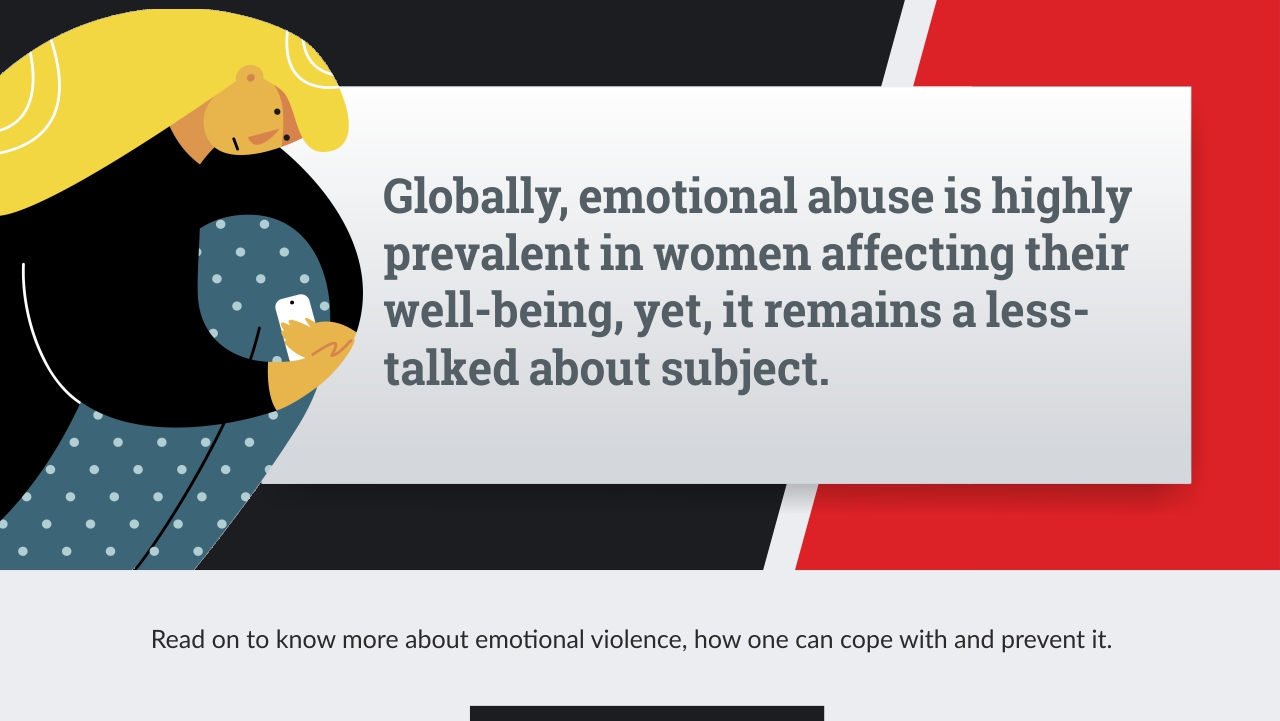- Home
- Healthcare Emotional Violence: The Invisible Block to Women’s Mental Health


Emotional Violence: The Invisible Block to Women’s Mental Health
23rd Sep, 2021
The term ‘violence’ immediately conjures up images of bloodshed, physical wounds and pain. But, what comes to the mind when we hear the term ‘emotional violence’? Suddenly, the mind goes silent unable to visualize something that cannot be seen or felt, but only experienced mentally.
Globally, emotional violence and/or abuse is highly prevalent in women affecting their mental health and well-being. Yet, it remains a less-talked about subject. In an effort to put emotional violence in the spotlight, Cadila Pharma held a webinar on the subject featuring experts from the women’s welfare and mental health fields including Dr. Nirav Mehta, Sr. Psychiatrist Dr. Seema Yadav, Director –Care Institute of Life Sciences; Dr. Bandna Gupta, Sr. Psychiatrist acknowledged the rise in emotional violence during the pandemic. Moderator Dr. Nayreen Daruwalla, Programme Director –SNEHA, and Payal Gahlot –Ladies Circle, and Asha Vaghasia, Director- We Positive Parenting.
The discussion was an enlightening one wherein important insights were gained into the larger issue of emotional violence, and solutions were highlighted as well. Read on to know more about emotional violence, how one can cope with and prevent it.
How Gender plays a role in Emotional Violence
Owing to gender differentiation, women invariably take on more roles and responsibilities than men. In other words, women carry a greater burden because they are women striving to be mothers, daughters-in-law, managers, wives, etc. When women falter in playing these roles, the often unpathetic reaction in the form of taunting, degrading, depriving, child abuse, etc. from their husbands and family members amounts to emotional violence.
Fears & insecurities: Causes that perpetuate emotional violence
In most cases, violence both physical and emotional goes unreported and uncorrected simply because women harbour fear and insecurities. They choose not to speak about emotional violence and abuse due to guilt, societal taboos and stigmas attached to talking about mental health and above all family matters in public.
Women continue to be in abusive relationships with husbands and intimate partners because they fear they won’t have a second chance at love. In extreme cases, women choose to remain silent for the fear of being fatally harmed by their family members and/or partners for speaking out.
More importantly, many women fail to realize that they are being emotionally violated as they become conditioned to it and normalize emotional violence. For example, the wife of a man with a bad temper will not see his mistreatment as emotional violence, but as his innate nature.
COVID-19 & Emotional Violence
There is an alarming increase in physical and emotional violence post-COVID 19. An NGO in Mumbai reported counselling over 5,000 women victims of emotional violence after the pandemic began. Spanning all classes and communities of society, emotional violence has taken its toll on families and marriages as a result of lockdown, financial difficulties, layoffs and increased substance abuse. Even patients seeking psychological help have discontinued treatment and relapsed as they are unable to pay for their treatment post-pandemic. As a result, women have reported disorders such as mixed depression, anxiety, adjustment, panic disorders, PTSD (Post Traumatic Stress Syndrome), etc.
The situation is grave indeed, but does that mean one must remain silent over emotional violence and mental health?
Solving the Dilemma of Emotional Violence: A Multi-Sectoral Approach
When it comes to mental and emotional health, experts suggest that emotional violence must be highlighted and addressed at the bio-psycho-social level with contributions from multiple actors e.g. mental health practitioners, family members, NGOs, counsellors, government, etc.
It is imperative that women know about the assistance available to them- if there is no awareness, emotional violence will continue. Thus mass awareness programs, sensitization of family members and close ones, workplace initiatives to detect and address emotional violence, more counselling centres, public and private mental health initiatives, livelihood development, etc. are the need of the hour.
Emotional violence remains a silent yet dangerous hurdle to women’s health and development. When a woman is emotionally healthy, she ensures her environment thrives encompassing herself, family, workplace, marriage, children, etc. As a community, emotional security of all people is paramount to ensure a progressive and secure society.
Array ( )
To give you the best possible experience every time you visit our site, we use cookies to identify and store your preferences on your browser. Continuing to browse our site means that you are "ok" with this. Learn more about our privacy policy.
Okay

